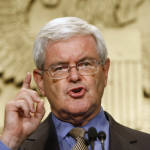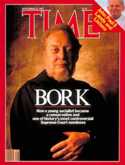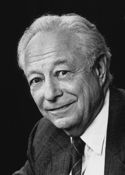Some do, sort of. But most of its major representatives do not. Another example is GOP hopeful Newt Gingrich.
 In his 1984 book, Window of Opportunity, Gingrich attacks laissez-faire and proposes what he calls “opportunity society conservatism”:
In his 1984 book, Window of Opportunity, Gingrich attacks laissez-faire and proposes what he calls “opportunity society conservatism”:
“The opportunity society calls not for a laissez-faire society in which the economic world is a neutral jungle of purely random individual behavior, but for forceful government intervention on behalf of growth and opportunity.”
So the free market is a “jungle” and “purely random” and Gingrich favors “forceful” government intervention.
Two more examples, recalling an earlier post — of anti-free-market conservatives, each representative of a different sub-species of conservatism.
 First the traditional conservatives, taking Robert Bork as representative, this from his Slouching Towards Gomorrah:
First the traditional conservatives, taking Robert Bork as representative, this from his Slouching Towards Gomorrah:
“Because both libertarians and modern liberals are oblivious to social reality, both demand radical personal autonomy in expression. That is one reason libertarians are not to be confused, as they often are, with conservatives” (p. 150). Bork goes on to argue that “Free market economists are particularly vulnerable to the libertarian virus” and to cite philosophical errors about ethics and human nature as the root problem: too often the free market economist “ignores the question of which wants it is moral to satisfy” (p. 151) and fails to recognize that “[u]nconstrained human nature will seek degeneracy often enough to create a disorderly, hedonistic, and dangerous society” (p. 153).
 Second, the neo-conservatives, taking Irving Kristol, “godfather” of the neo-cons, as representative, this from his contribution to his co-edited Capitalism Today:
Second, the neo-conservatives, taking Irving Kristol, “godfather” of the neo-cons, as representative, this from his contribution to his co-edited Capitalism Today:
“The inner spiritual chaos of the times, so powerfully created by the dynamics of capitalism itself, is such as to make nihilism an easy temptation. A ‘free society’ in Hayek’s sense gives birth in massive numbers to ‘free spirits’ – emptied of moral substance” (p. 13).
Gingrich, Bork, and Kristol are among the biggest names in contemporary American conservatism and all are opposed to free-market capitalism. Can we cite equally prominent conservatives who are forcefully and consistently free-market capitalist? So what are we to make of the often-held view that connects conservatives to economic liberty? Is it merely that they are relatively less anti-free-market than their left-leaning opponents?
[Source for the Gingrich quotation: David Brooks, “The Gingrich Tragedy.” The New York Times, December 8, 2011.]
“Can we cite equally prominent conservatives who are forcefully and consistently free-market capitalist?”
Only if one uses the popular concept of what it means to be “conservative.” As it is most commonly used in conversation and in the media, “conservative” is used to describe anybody who argues against state encroachment upon individual liberty beyond the status quo unless such encroachment involves military or law enforcement powers.
Most folks consider the following intellectuals to be conservatives.
Thomas Sowell, though he’d object to the word.
see http://www.nationalreview.com/articles/246682/evolution-term-conservative-thomas-sowell
Milton Friedman, though he, too, said he was a small “l” libertarian and a capital “R” Republican.
Hayek, of course, wrote “Why I Am Not a Conservative”.
http://www.lewrockwell.com/orig6/hayek1.html
However, even Hayek’s Road to Serfdom acknowledged a need for state-sponsored social programs. They’re too radical to be conservatives, but too conservatives to be anarcho-capitalist libertarians. Mises was right to call Friedman and Hayek socialists … well, in a hyperbolic sort of way.
Mises, Hayek, and Friedman at Mont Pelerin
http://www.youtube.com/watch?v=tkQfK8hn0ds